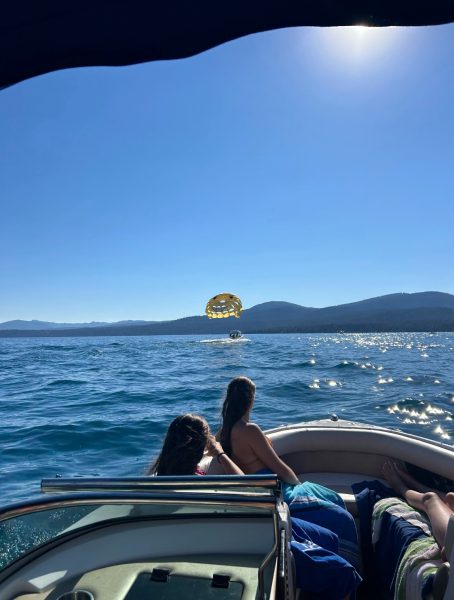Wildly popular documentary “Blackfish” removed from Netflix
“Blackfish”, a 2013 documentary about Killer Whales in captivity, explores many things: The lives of the whales, the everyday lives of the trainers, and their relationships with the whales. However, it also explores the abusive behaviors from the trainers that the whales endured. “Blackfish” recaps the lives of many whales who drastically shifted from being happy and content, to drowning their trainers in the water. After 8 years, during which it reigned as the highest-rated science or nature documentary on Netflix, “Blackfish” is being removed by the site, due to unknown official reasons.
Prior to “Blackfish”, SeaWorld’s treatment of the animals in their amusement parks was unknown to the public. However, in January 2021 alone, more than 3.1 million people watched “Blackfish”, proving that it was a groundbreaking documentary exposing Seaworld for their crimes. Why is it now being taken off of the most popular streaming service? Some, like the Hollywood Reporter, claim the documentary is being removed to make room for newer shows and movies. Others claim that the documentary falsely stated that the interviewees in the movie were inexperienced in Killer Whale training, as most primarily worked with other animals.
In the documentary, over 10 former trainers were interviewed about their work at SeaWorld, Sealand, or Loro Parque (An interactive sea park in Spain, very similar to the Sea World franchise). Many of these trainers were close to or knew the trainers that had been killed by whales in these amusement parks. According to a fact sheet from PeTA, people for the ethical treatment of animals, all three current seaworld parts have failed to meet federal AWA (Animal Welfare Act) standards. In March 2014, legislation was passed to end the use of whales for entertainment shows in California. Richard Bloom, State Assemblyman, proved SeaWorld’s claim that their revenue would go down without whale shows to be wrong.
Bloom told KQED in an interview, “The evolution of these parks and the evolution of zoos and aquariums is in the direction of non-performance,” Bloom stated. “[The Monterey Bay Aquarium] had to confront the paradigm that said ‘You can’t make this successful without having orcas and without having dolphins.’ And they said, ‘That’s not correct.’ They actually have no performances, no cetaceans, and there are people lined up out the door.”
Monterey Bay Aquarium values are focused on education and the rehabilitation of most animals. Between 2002 and 2016, the aquarium released 37 sea otters back to the wild after their time in rehabilitation.
With more shows and movies coming out like “Blackfish”, “Tiger King”, and “Seaspiracy”, people are learning the behind-the-scenes impact of humans on the environment and other species living alongside us. The release of “Blackfish” back in 2013 triggered many protests about unethical treatment of Killer Whales and other animals in captivity. There are still over 50 Killer Whales in captivity today in the state of California alone. The true message of “Blackfish” still holds true—that no whale should be forced to live in any confined space—even if the documentary may contain certain inaccuracies.





Emily bee • Sep 17, 2021 at 4:20 pm
So clearly Joseph Charles works for seaworld
Bob • Nov 2, 2023 at 12:27 pm
Regardless of whether you believe that orcas should ever be in captivity, the documentary has numerous factual errors. For example, it suggests that in captivity orcas only live to about 30. According to Wikipedia, the three current Seaworld orcas that were captured in the wild are currently 58, 48 and 46. In addition, most of the trainers interviewed for the documentary have stated that their statements were mischaracterized or edited to falsely portray conditions at Seaworld. Those trainers also said that after watching the film, they felt mislead by the filmmaker. There are real issues with cetacean captivity, but Blackfish was a hitjob from a filmmaker more concerned about trying to get an Oscar than trying to portray the truth. In that respect, Blackfish itself is offensive because the tactics used by the filmmaker cast doubt on the real work being done by documentarians who do try to be accurate.
Joseph Charles • May 23, 2021 at 3:03 pm
‘The true message of “Blackfish” still holds true—that no whale should be forced to live in any confined space—even if the documentary may contain certain inaccuracies.’
It does not hold true because the premises advanced in the film are scientifically inaccurate and misleading. It isn’t a reliable source for scientific knowledge of killer whale cognition, or physiological, nutritive and psychological needs. It does not succeed in arguing that the available evidence supports the philosophical and moral belief that killer whales ought not live under human care for public exhibition. If you come to that conclusion based on the arguments in “Blackfish,” that conclusion is wrong.
Ghost • Nov 28, 2022 at 11:19 am
But it does, the information spread by Seaworld is provable false and Blackfish aims to correct it, such as the idea that Orcas only live to 30-35 and that they live longer in captivity. This is untrue and known at the time to be untrue but spread by Seaworld to make the environment look more humane. It does succeed in arguing that the available evidence supports the belief that Orca ought not to live under human care for public exhibition because it shows the treatment of the animals, from raking and fighting to simple floating at the surface of the pool. Blackfish clearly demonstrates the inability to house or care for such large and cognitive creatures. It is known now and at the time of the Orcas housing in Seaworld that they swim thousands of miles and in a pod, Seaworld place animals from different pods in a pool which for a whale that can swim up to 100 miles a day is similar is a bathtub. Seaworld and their higher-ups such as Kelly Clark allowed animals to live in inhumane conditions which lead to them becoming bored and aggressive creating an unsafe, dangerous and unfortunately deadly place to work.
The deaths and injuries which occurred at Seaworld, Sealand and Loro Parque were preventable and unjust, your viewpoint and conclusion itself is inhumane and unfounded and I suggest you rewatch the documentary and fact check it if you are so sure it is untrue, as you have provide no evidence or examples your view cannot be considered seriously.
Bai Mi • Apr 21, 2024 at 11:11 am
You’re a joke Joseph.
Massive intelligent animals who are used to living their lives with their families in the MASSIVE ocean, DO NOT belong as enslaved beings living in tiny pools doing stupid tricks for humans.
Give your head a shake Mr. “I probably work for or have investments in SeaWorld/similar” and get some better morals/values.
Once upon a time there were people who thought slavery was great because it made them a lot of money. Obviously we still have such dirt bags who love MONEY above all else. Today we’ve got people getting rich from the Military Industrial Complex and a million other examples of humans doing bad things to make money because they worship at the altar of Mammon.
MAKE THESE PLACES ILLEGAL!!!